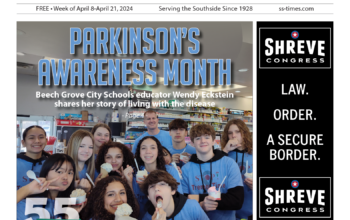By Curtis Honeycutt
Are you ready for a linguistic adventure that blurs the lines of words and verbal volleyball? Buckle up, buttercup, because things are about to go to a-whole-nother level of morphological creativity.
We’ll start with tmesis (pronounced tuh-MEE-siss). In speech or writing, tmesis divides a word into parts to provide emphasis. Tmesis doesn’t change the meaning of the original word being modified. I’ll explain.
The word “tmesis” is borrowed (or loaned) directly from Greek, meaning “a cutting.” Sometimes you’ll hear or read someone using tmesis like this: “You didn’t do your homework again? Un-be-lievable.” In this instance, the teacher or parent chides the student by breaking up the word “unbelievable” into separate parts, emphasizing that the student is apparently developing a pattern of shirking her homework duties.
Here’s an example of tmesis from TV. In the show “How I Met Your Mother,” Neil Patrick Harris’ character Barney Stinson loves using the word “legendary,” often using tmesis to add to its impact. In one episode, he’s talking with his friends Ted and Marshall. “For the first time ever, the three of us are single at the same time. I’ve dreamed about this, boys, and it’s going to be le-gen-dary.”
Sure, you know about prefixes and suffixes, but what about infixes? An infix inserts another word into the middle of a word not only to add emphasis, but sometimes to change the meaning of the word.
I’ll continue to use Barney Stinson’s multiple deliveries of the word “legendary” to illustrate infixes. In another episode, Barney is fighting an illness, not wanting it to slow him down. Instead of taking it easy, he makes these plans: “Play a couple hours of laser tag, maybe get a spray-on tan, it’s going to be legen-wait-for-it-dary!”
You’ll notice how adding “wait for it” into “legendary” adds significant emphasis as well as humor (or annoyance … you pick). Another way you’ll often see a word get infixed is by adding an expletive in the middle. For our purposes, I’m going to use the word “freaking.”
“You lost the giraffe? Oh great. That’s just great. That is abso-freaking-lutely fantastic.” You’ll notice the speaker here adds a double-stuffed cream in the middle of the sandwich cookie of “absolutely” to indicate extreme displeasure with the situation.
I know many of my fellow word nerds dislike the use of a-whole-nother I wrote in the first paragraph. Like it or not, it’s another example of infixing. If you really don’t like it, puh-leaze don’t send me emails.
—Curtis Honeycutt is an award-winning syndicated humor columnist and author. Connect with him at curtishoneycutt.com.


